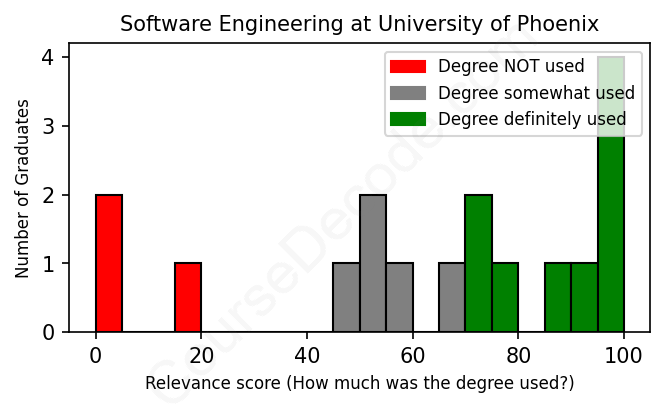
First, some facts. Of the Software Engineering graduates from University of Phoenix we've analyzed , here's how many have used (or NOT used) their degree in their career:

These are estimates based on AI analysis of 17 LinkedIn profiles (see below).
The verdict? Slightly below average. Overall, with an average relevance score of 64%, Software Engineering graduates from University of Phoenix have a slightly lower likelihood (-3%) of finding work in this field compared to the average graduate across all fields:
And for comparison, here's the chart for all profiles we've looked at across all degrees.
Also, after graduating, only 29% of these graduates have pursued further education other than another Bachelor's degree (such as a Masters degree or other), compared to the average across all profiles of 35%. This suggests a Bachelors degree is enough for most Software Engineering graduates, and it's normal to look for work straight after graduation.
See the details:
|
Relevance score: 0% We think this person has NOT gone into a career related to their degree. We think this person has NOT gone into a career related to their degree.
DEGREE INFOGraduated in 2012 from University of Phoenix with a Bachelor of Science (B.S.) in Software Engineering. No other secondary education since. JOB HISTORY SINCE GRADUATIONOwner Dental Dynamics Laboratory Apr 2013 - Jul 2016 ABOUTI am excited to announce that I am now working as a real estate broker with Keller Williams Puget Sound! Working with residential real estate customers is an inspiring and rewarding experience. I am trained as a consultant as well as an agent and looking forward to helping people unlock doors to their dreams!Be sure to check out my AWESOME home search at www.weunlockdoors.comContact me for a quick look at your home's value and neighborhood information! |
The top 10 most common jobs done by the graduates we've analyzed (ranked most common to least) are:
After looking at a bunch of LinkedIn profiles of people who graduated with a Software Engineering degree from the University of Phoenix, it seems like they ended up in a pretty mixed bag of jobs. Some common roles include Operations Managers, Business Analysts, and IT Consultants, but many of these positions don’t really scream “software engineering." For example, jobs like Production Team Leader or Operations Manager are more about managing processes and teams than actually developing software. Even though these roles might benefit from some technical skills acquired during their studies, they don’t typically involve core coding or engineering duties.
On the brighter side, there are definitely some positions that align closely with software engineering. Roles like Software Engineers, Senior Agile QA Engineers, and Cybersecurity IT Specialists show that some grads are directly applying their training in software development, coding, and system security. However, looking at the overall picture, it seems like many graduates are working in areas that do not completely utilize their software engineering expertise. While they may be using some of the problem-solving and analytical skills learned in their degree, most of these jobs are steering away from the hard coding and technical work that defines software engineering. So, while some folks are totally in their element, others may need to pivot a bit to find roles that match their skills more closely!
Here is a visual representation of the most common words in job titles for Software Engineering graduates (this is across all Software Engineering graduates we've analyzed, not just those who went to University of Phoenix):

Looking at the career trajectories of graduates from the University of Phoenix with degrees in Software Engineering, it's clear that many have started off in roles that align with their degree. Right after graduating, a good number of them landed jobs that are tech-related, like IT analysts, software engineers, and network operations technicians. These entry-level positions seem to pave the way for more specialized roles down the line, with many individuals moving up into managerial or senior-level positions within just a few years.
As we zoom out to see where these folks end up 5 to 10 years later, it’s evident that a decent chunk has remained in the tech field, advancing to roles like Senior Software Engineer, Principal Cyber Security Engineer, and even Director of Quality Engineering. However, there are a few outliers whose paths diverged into less tech-centric careers, such as operations management or even freelance gigs that aren't directly related to software engineering. Overall, though, the trend leans towards strong career prospects within the technology sector, suggesting that a degree in Software Engineering from the University of Phoenix can indeed lead to successful and relevant careers in the tech industry.
Getting a Bachelor's degree in Software Engineering can vary in difficulty depending on where you study, but generally speaking, it's a pretty challenging field. You'll dive deep into programming, algorithms, and systems design, and that can be tough if you’re not super into math and tech stuff. The courses can be intense, with a lot of programming projects and teamwork involved, which requires time management and dedication. At the University of Phoenix specifically, the format is often more flexible and online-focused, which can make it a bit easier to juggle with other commitments, but it still demands a solid commitment to learning the material. Overall, it's definitely not a walk in the park, but if you’re passionate about tech, it can be a rewarding challenge!
Most commonly, in the LinkedIn profiles we've looked at, it takes people 2 years to finish a Bachelor degree in Software Engineering.
Looking at these graduates from the University of Phoenix, it seems like they’re generally doing pretty well for themselves, especially those in tech roles. Most have held positions that likely pay decent salaries, especially jobs like Senior Network Operations Technician or Program Manager at Tableau. Even roles like the Principal Cyber Security Engineer at Raytheon and various managerial positions hint at solid earnings. However, there are some who might not be in high-paying jobs, like the Stove Cleaner and Shipping Receiving Specialist, suggesting that their paths might not have landed them in the higher salary brackets. Overall, it looks like the ones who stuck with IT and tech-related jobs are probably pulling in good pay, while others may be in more modest positions.
Here is a visual representation of the most common words seen in the "about" section of LinkedIn profiles who have a Bachelor degree in Software Engineering (this is across all Software Engineering graduates we've analyzed, not just those who went to University of Phoenix). This may or may not be useful:

Here are all colleges offering a Bachelor degree in Software Engineering (ordered by the average relevance score of their Software Engineering graduates, best to worst) where we have analyzed at least 10 of their graduates:
| College | Score | Count |
|---|---|---|
 San Jose State University San Jose State University
|
88 | 12 |
 Iowa State University Iowa State University
|
87 | 10 |
 The University of Texas at Dallas The University of Texas at Dallas
|
86 | 15 |
 Brigham Young University - Idaho Brigham Young University - Idaho
|
85 | 19 |
 Arizona State University Arizona State University
|
83 | 13 |
 Florida Gulf Coast University Florida Gulf Coast University
|
72 | 17 |
 University of Phoenix University of Phoenix
|
64 | 17 |
 Kennesaw State University Kennesaw State University
|
62 | 10 |
 Western Governors University Western Governors University
|
60 | 10 |